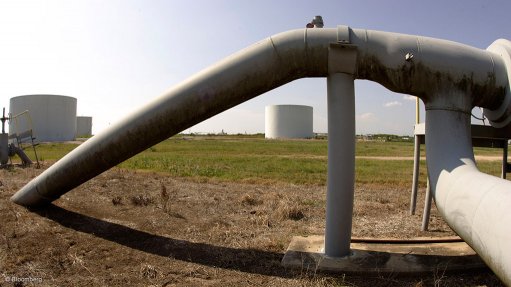
GAS PRODUCT
The gas industry produces industrial products, like gas condensates and urea fertiliser, which increase the investment return and attractiveness of gas projects
Photo by: Bloomberg
The once-promising notion that gas was soon to become a game changer in Africa seems unlikely to happen in the near future, owing to the negative impact of the low oil price on the industry, says growth consulting firm Frost & Sullivan.
“A preliminary assessment of global market moves by international oil companies (IOC) and gas producers seems to show that oil and gas exploration [projects] have been negatively affected by low oil prices,” says Frost & Sullivan Africa consulting associate Kumbirai Gundani.
Oil and gas companies Royal Dutch Shell and Tullow Oil last year cut exploration costs and implemented divestment plans, which negatively affected exploration projects in Mauritania and Namibia, in Africa; as well as French Guiana, off the north Atlantic coast of South America.
Exploration and Drilling Cuts
Gundani tells Engineering News that Frost & Sullivan is expecting several IOC’s to make exploration and drilling cuts this year.
Multinational energy corporation ConocoPhillips announced in December last year that it would slash capital expenditure in 2015 by 20%, reduce its spending budget to $13.5-billion and defer significant investment on its projects, including initial-stage development and exploration drilling.
The company is likely to defer its early-stage Block 37 exploration in Angola’s Kwanza basin after finding a dry well in the adjacent Block 36 late last year, says Gundani.
He further points out that oil and gas company BP is planning to cut costs by close to $2-billion as it attempts to arrest drops in profits. Industry analysts also expect energy corporation Chevron to cut costs by 11% to 14% of its exploration and drilling budget, Gundani says.
Brighter Outlook
Gundani points out, however, that there are some positive developments taking place amid the expenditure cuts.
He says Mozambique is aiming to unlock its gas reserves this year, driven by secure demand from likely offtakers that include, but are not limited to, Japan, India and South Africa.
“In lieu of falling oil prices, gas projects are relevant. Besides dry and liquefied natural gas, the gas industry also produces other industrial products, like butane, cement, gas condensates, methanol and urea fertiliser, which all increase the investment return and attractiveness of gas projects, especially in terms of economic industrialisation.”
Gundani says African policymakers need to ensure that competitive and comprehensive gas master plans and regulations, designed and tabled timeously, are implemented to attract and sustain foreign direct investment in gas projects.
He concludes that, while policymakers design and implement clear legislation to regulate the industry, the opportunity for regional engineering, procurement and construction management companies exists to tailor gas offerings accordingly and to capitalise on unlocking vast opportunities in the African gas economy.